A young woman clad in rusted armor stands alone in the desert.
Behind her lies a village wrought from scraps of the ruined world—huts of rusted sheet metal and fractured concrete, torn fabric tents rustling in a dry wind. Before her looms the enormous frame of a towering machine—its rusted limbs screeching as it plods toward her, less than a hundred steps from crushing her village beneath its iron hooves.
She quickly turns to face her village where the frightened eyes of her people look on from the shadowy doorways, or peek between the shards of rubble which surround the dusty shanties. With a deep breath, she draws her blade from its scabbard, and pulls its gleaming tip across the sand at her feet.
“Only one of us shall cross this line today…” she utters, and turns around again to fix her eyes upon the advancing machine, gripping the hilt of her sword until her fingers throb.
Obviously in real life, a broadsword, spear, or battle-axe would make a pretty poor choice in a boxing match with a bulldozer.
Yet in the world of Terragaste where my upcoming novel takes place, characters frequently resort to medieval weapons to attack and destroy enormous chunks of machinery.
So the big question is—why medieval weapons?
I mean—wouldn’t a gun, a rocket launcher, or an EMP prove massively more effective?
Sure it would, but this begs the question, “Effective at what?”
At destroying machines?
Of course.
At weaving an exciting tale?
Maybe not.
Here’s ten reasons why the warriors of Terragaste use swords to dismantle industrial hardware.
A young woman clad in rusted armor stands alone in the desert.
Behind her lies a village wrought from scraps of the ruined world—huts of rusted sheet metal and fractured concrete, torn fabric tents rustling in a dry wind. Before her looms the enormous frame of a towering machine—its rusted limbs screeching as it plods toward her, less than a hundred steps from crushing her village beneath its iron hooves.
She quickly turns to face her village where the frightened eyes of her people look on from the shadowy doorways, or peek between the shards of rubble which surround the dusty shanties. With a deep breath, she draws her blade from its scabbard, and pulls its gleaming tip across the sand at her feet.
“Only one of us shall cross this line today…” she utters, and turns around again to fix her eyes upon the advancing machine, gripping the hilt of her sword until her fingers throb.
Obviously in real life, a broadsword, spear, or battle-axe would make a pretty poor choice in a boxing match with a bulldozer.
Yet in the world of Terragaste where my upcoming novel takes place, characters frequently resort to medieval weapons to attack and destroy enormous chunks of machinery.
So the big question is—why medieval weapons?
I mean—wouldn’t a gun, a rocket launcher, or an EMP prove massively more effective?
Sure it would, but this begs the question, “Effective at what?”
At destroying machines?
Of course.
At weaving an exciting tale?
Maybe not.
Here’s ten reasons why the warriors of Terragaste use swords to dismantle industrial hardware.
1. It’s Epic
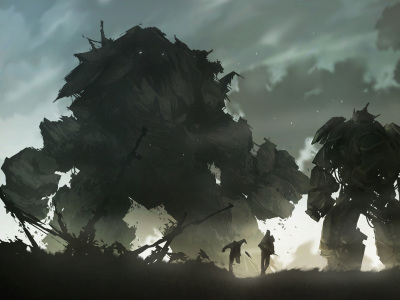
Golem Mechs by FacundoDiaz
If our protagonist in the scene above had a gun in her hand instead of a sword, the scene would feel radically different—wouldn’t it?
With a sword in hand, we know she’s going to have to actually get within spitting distance of the machine, despite the fact that it’s clearly large enough to step on her house.
That’s scary as hell when you think about it.
If she could just open fire on the thing from a safe distance, the suspense would be gone—unless the machine could fire back, of course, but then we’d have a different story on our hands.
Could it still be epic?
Sure.
Would it be epic in the same way?
Not a chance.
In fact I would argue that it’s more epic because…
2. Fighting an Enormous Machine with a Broadsword is Inherently Ineffective
The sword is obviously not an optimal tool for this job. Yet placing primitive weaponry in the hands of a protagonist who has to fight a gigantic machine automatically forces them into a weaker position.
And you know what?
We all love an underdog.
I mean—if we had Gandalf the Über-Magical Badass flying the ring into Mt. Doom on the back of a shiny white dragon instead of a couple of feeble hobbits and a schizophrenic goblin with frenemy status sneaking it in on foot, The Lord of the Rings would have been far less gripping.

Bottom line is—circumstances that stack the chips against the protagonists always make for better storytelling.
And just as the burden of the Ring took all the strength of the Hobbits to endure…
3. Swords Not Only Bestow Power, They Also Require Power
One of the many reasons I prefer medieval weapons in my battle scenes is because their power largely stems from the characters who wield them.
Not that guns don’t require skill to use effectively—but the fully-automatic Megablaster X-7 will be no more powerful in the hands of Rambo than in those of Roger Rabbit.
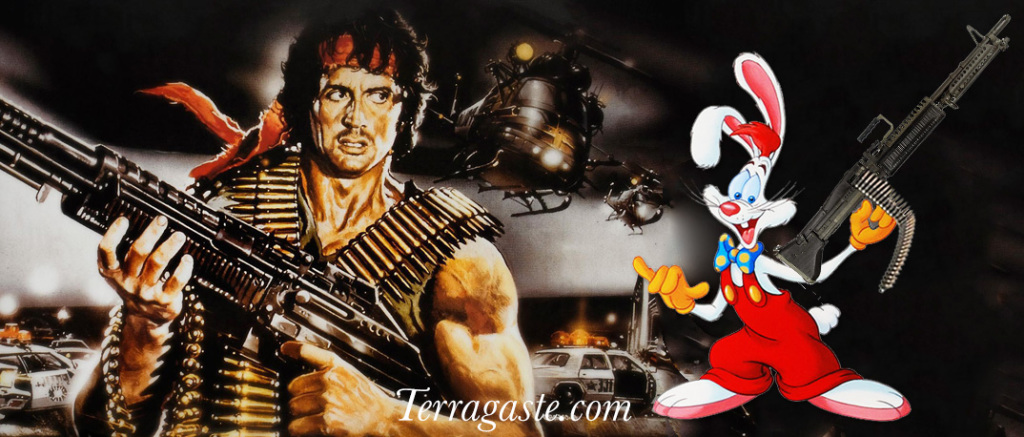
Or, for that matter, the disgruntled student at your kid’s school.
But do you see what just happened there?
Bringing the image of guns from a fictional place to a real place changed the picture in your mind dramatically. A second ago we were laughing about a cartoon character. Now we’re thinking about mass murderers fresh out of their diapers.
The fact is, guns are wrapped up in a whole litany of very rigid symbolism. But swords on the other hand…
4. Swords are Open Symbolic Territory
The days when the sight of a sword being drawn in public would cause people to gasp and run for cover are long over.
For most people swords today symbolize chivalry, history, fantasy, and on occasion martial arts.
When I think of guns, however, I generally envision soldiers fighting poorly justified wars for profit and empire, crazed kids opening fire at their classmates, camo-clad white dudes murdering animals, or creeps like Charlton Heston flailing bolt-action rifles over their heads.
Needless to say, I did not grow up in a gun household.
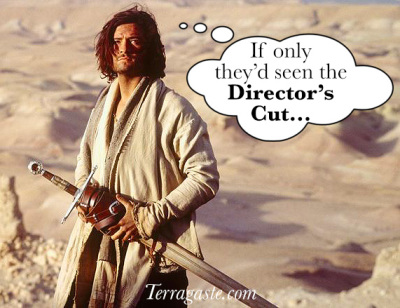 But either way, the fact is that we now have enough historical distance from the era of sword carnage, that the sword itself has become open territory for heroic feats and righteous heroes in a way that the gun never will within our lifetimes.
But either way, the fact is that we now have enough historical distance from the era of sword carnage, that the sword itself has become open territory for heroic feats and righteous heroes in a way that the gun never will within our lifetimes.
Consider Seven Samurai, Rob Roy, and Kingdom of Heaven (Director’s Cut only, please!). The inclusion of swords is part of what makes these stories so powerful.
Besides, considering the speed, accuracy, and sensory capacity of modern machines—I don’t think a gun is gonna help you much in a shootout with Killbot 5000.
But luckily for my characters…
5. In the World of Terragaste, the Machines are Not the Terminator
In Terragaste, I intentionally avoided AI controlled robots with a vendetta against humanity.
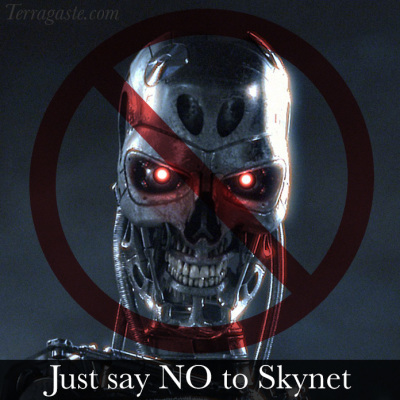 Partly because this idea has already been done to death, but also because in the Terragaste world, the machines (or “Beasts,” as the people of Terragaste call them) are relics—representations of the forgotten world that once was.
Partly because this idea has already been done to death, but also because in the Terragaste world, the machines (or “Beasts,” as the people of Terragaste call them) are relics—representations of the forgotten world that once was.
In fact, the “Beasts” are merely carrying out whatever functions they were programmed with generations ago. Unfortunately, this programming often proves incompatible with human efforts for survival.
Or to put it another way, the people of Terragaste live in a world where the lumbering, rusted-over systems of a bygone era continue to impede upon and threaten their ability to live their lives.
I think the real world suffers from this problem too.
Yet since the “Beasts” in Terragaste are relatively simple, dismantling them with medieval weapons winds up making more sense because…
6. Medieval Weapons are Primitive Technology
As in most post-apocalyptic scenarios, the world of Terragaste has suffered from mass depopulation, environmental degradation, the outright collapse of civilization, and the regression of technological advancement.
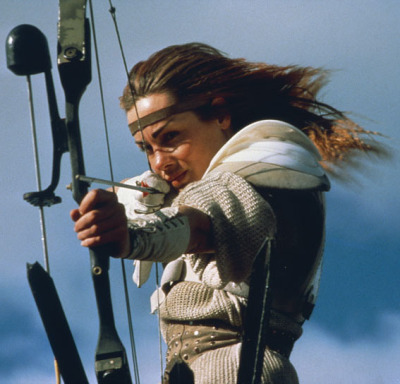
Bow-wielding warrior woman from the Road Warrior
By this measure, it makes sense that people would revert to using tools and systems which demand fewer resources—and require less knowledge—to create and maintain. As social priorities shift more and more toward basic survival, the fancy stuff gets left behind.
That’s why the use of bows and arrows made sense in the Road Warrior, and it’s why underground sewage and indoor faucets disappeared for hundreds of years after the collapse of the Roman Empire.
Crapping in the ditch and tossing a bucket down the well were more easily accessible ideas—and they got the job done.
Yet in the wonderful world of storytelling, primitive technology such as swords pique the imagination because…
7. Swords are Time Travel Devices
Yup.
Leave your flux capacitors at home, Kids!
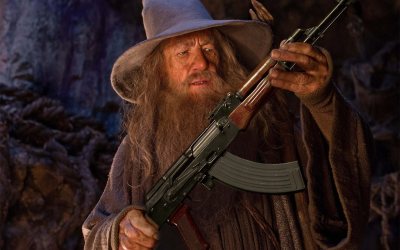
“When you absolutely positively got to kill every muthafuckin’ orc in the room…”
—Gandalf the Grey AK
As soon as you place a medieval weapon in the hands of your character, your readers have traversed space and time. In the scene at the beginning of the post, if our protagonist had a modern weapon in hand, we’d assume we were in modern times simply because we’d been given no impetus to think otherwise.
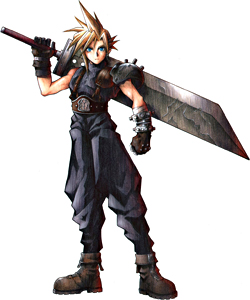
Cloud Strife from Final Fantasy VII, on the other hand, uses his Buster Sword to fight humans, monsters, robots, and dragons.
Likewise, if the only snippet you had to go on was something like, “His steel blade sang as he drew it from the scabbard,” you’d probably assume we were in a work of historical fiction or of fantasy.
And you’d be right.
I mean really—those are the only two options available.
However, a sword-wielding hero facing off against a machine, while clearly fantasy, mixes disparate historical elements, forcing us to ask, “Where are we? When are we? How will this work out?”
Of course in reality it wouldn’t work out, but if you dig this kind of stuff then you know…
8. In the Wonderful World of Sci-fi/Fantasy, (for the Most Part) Anything Goes
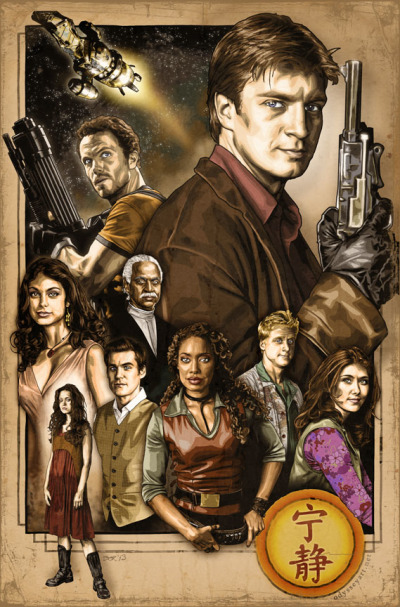
Epic Firefly poster by Odysseyart
…So long as you can make it work within the context of your story, that is.
But what makes an unbelievable idea “work” in the realm of fiction?
Consistency.
Whatever the magical or pseudo-scientific thing might be in a given story, so long as it’s clearly defined, and then used consistently within the logic of the story, most readers won’t ever question it.
The transporters in Star Trek, the wild west armaments in Firefly, and the nefarious side-effects of the Ring in The Lord of the Rings all make sense within their respective stories because they’re used consistently.
So if a story shows us that a skilled warrior with a broadsword can hack the steel arm off a huge rusty robot—and then maintains that principle throughout the tale—we have no choice but to accept it.
Which is good news for me because, in my opinion at least…
9. Sword Battles are More Interesting to Write (and Read)
I’m going to be honest with you here—the idea of writing battle scenes full of onomatopoeia doesn’t fire me up.
A mortar whizzed down beside the trench with a deafening boom, sending rocks and dirt clanking across the shovels and helmets of the platoon. Jenkins’ ears rang, drowning out for a brief moment the endless rat-tat-tat of enemy fire.
Ugh—no thanks.
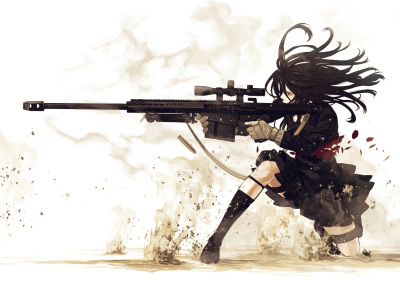
Sniper Girl by Butterfly M82A1
I mean, not that swords and arrows and war-hammers and whatnot don’t swish and clank and ring and thud—but they provide more opportunity for other kinds of descriptions because you can actually see them in action.
Bullets just explode into motion, whizz by, or slam into things, and the only descriptive opportunities you have involve wounds, shrapnel, and percussive sounds.
I’m not saying there aren’t ways to keep this kind of action interesting, but it just ain’t my cup of tea.
Especially because…
10. Sword Fights with Giant Robots are Totally Freakin’ Awesome
In the Terragaste world, dangerous machines—or “Beasts”—are everywhere, and the warriors who oppose them represent the only barrier between life and death for the remnants of humanity.
“Trapped between fury and fear, the warrior brought his blade down upon the Beast, lashing out at the arm which had so nearly obliterated him. The mighty stroke collided like a thunderbolt. Steel burst beneath the blow in a torrent of sparks, Black Blood gushed like a geyser from the wound, and the resultant clangor billowed into the forest like a shockwave as the Beast’s arm tumbled to the ground, tearing up dirt and brittle roots as it fell, never to stir again.” —Excerpt from Terragaste: Tale of the Red Star Knight
No matter which way you dice it, sword battles with giant machines are just plain awesome.
Or at least—they are in my book.
How do you feel about sword battles in books, film, and games?
Be sure to let me know in the comments.
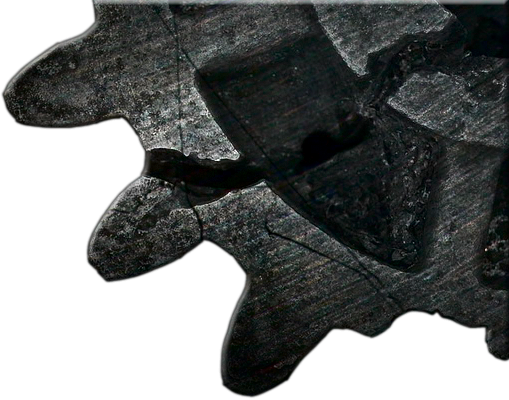
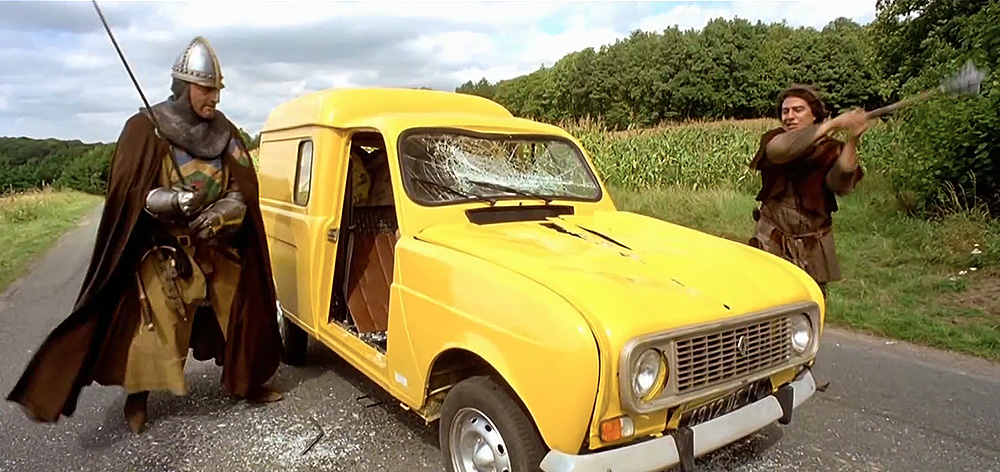
There is something so dramatic and satisfying about wielding a sword. The vibration with contact. The entire muscle fibers in use compared to a gun. “BANG, you’re dead!” vs … What? It is a whole physical experience involving the body and mind which has no single word to reveal it. Thanks for making me think about it!
Thanks for reading. You kind of nailed it—the full physicality absolutely offers richer opportunities for description and character development. And again, I can’t stress enough the importance of having a character’s power come from within them instead of from within an external object.
Excellent points sir. And ‘Gandalf AK’ and ‘Gollum the frenemy’…priceless!
As for your overall argument, I think an excellent existing example is the answer to the question below.
– Name the popular the space epic where the highest respected warriors never use guns despite their prevalence? –
Hint: they even use their medieval weapons to battle machines in the early installments…but no one likes to talk about those battles much these days 😉
Here’s to Terragaste being an even better example of the sword being mightier. Cheers!
Star Wars!
Damn, you know I completely overlooked that series while writing this, but it quite definitively shows how swords are more epic, require inner power from the characters, and create an automatic underdog persona when contrasted with guns.
Well played, Sir. Well played.
Indeed!
Also, just another observation to share with other readers out there:
You’re all welcome to comment, even if your name isn’t Peter. Hahaha!
But your comment has an 84% chance of being 27% more awesome if your name IS Peter.
Just sayin’.
Great post! You’ve given a thorough and compelling discussion of how the sword functions symbolically and metaphorically, and generally badassedly, in works of science fiction and fantasy. From a writer’s perspective, the observation that anything consistent to the world it appears in will be acceptable to the reader, is really important. Your own Terragaste story (“The Tale of the Redstar Knight”) abounds in richly imagined details of a postapocalyptic world in which remnants of the techno-theocracy that brought about its own destruction still roam the landscape, posing a physical threat that the remaining tribes must fight along with the dregs of the ideology that produced the catastrophe in the first place. Your post does an excellent job of explaining why these “Beasts” are fought with medieval weaponry, and why it works! I think the famous phrase “suspension of disbelief” actually has it backwards — I think, for the reader, it’s more like a willing surrender to belief. As long as the writer keeps things consistent to the world created in the story, of course!
Thanks for the high praise!
I think you’re spot on. Rather than entreating us to put on hold a tendency toward skepticism, stories in truth invite us to believe in them. Knowing that a story such as fantasy or sci-fi contains impossibilities doesn’t alter this fundamental relationship—and if anything, enhances it.
Assuming always, of course, unwavering consistency.
If anything, the tendency for readers/viewers/players to believe in a story is exactly why a departure from consistency inevitably proves jarring—it breaks our trust, without which belief cannot survive.